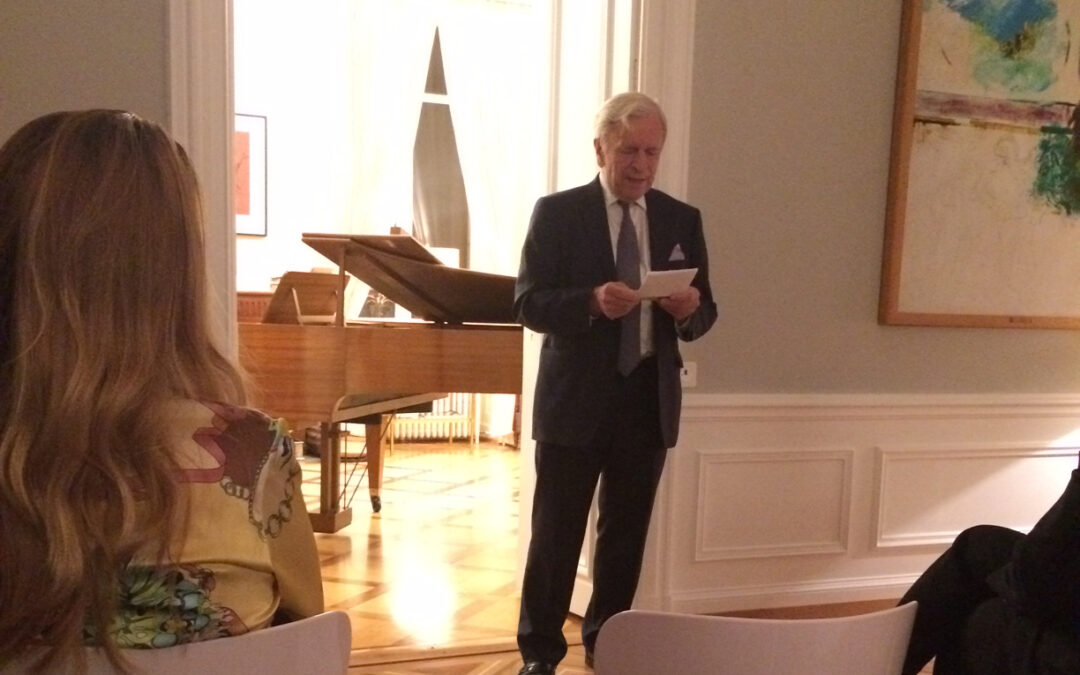
Oct 24, 2018 | News
The ICJ started its 60th anniversary in Geneva with an evening gala hosted by Ambassador Julian Braithwaite, at his residence on 18 October 2018. A moving speech by Sir Nicolas Bratza (photo), ICJ Commissioner and Executive Committee member, on the importance of the defence of the rule of law opened the evening.
It was followed by a magnificent concert by Menuhin Academy virtuoso, violinist Vasyl Zatsikha. A magical evening.
The speech of Sir Nicolas Bratza
“I feel very privileged to have been asked to say a few words by way of introduction to the speech of the Secretary General of the ICJ.
May I begin by expressing on behalf of us all the warmest thanks to the British Ambassador for hosting this very special celebration of the 60th anniversary of the ICJ in its home in Geneva.
Anniversaries are always important occasions and never more so than when they mark a milestone in the life of a remarkable organization that has throughout its existence worked tirelessly to safeguard the rule of law and human rights and that has done so, in particular, by protecting and defending the independence of judges and lawyers.
My association with the ICJ has been relatively brief but for many years I have admired its work from afar, as a member of the European Commission of Human Rights for five years and as a judge of the Strasbourg Court, for fourteen.
The Court and the ICJ share the common purpose – to protect the fundamental principles of democracy, the rule of law and human rights.
Without the independent and impartiality of judges, both national and international, those principles would be meaningless and might as well have been written on water.
With the alarming growth of populism in countries across the world, the threats to the independence of the judiciary are regrettably as real today as they have been at any time.
In the international Court of which I was a member, judges are nominated by the States from which they are drawn.
But they are in no sense representatives of those States and are not infrequently faced with having to decide cases, sometimes cases of acute sensitivity, against their own countries.
The pressures on judges of the Court are often intense and there are notorious examples where the courage shown by a judge in maintaining his or her rigorous independence has come at a cost, the judge being punished by not being renominated by the State, by returning to the country at the end of their mandate without employment or means of livelihood, or by being unable to return safely to their home at all.
But if the position of the international judge is difficult enough, that of the national judge in certain States, including member States of the Council of Europe, is far worse, their independence and security, both physical and professional, being under constant threat.
In the 1990s and in the early years of this century, the signs were promising. One was able to witness a slow but steady improvement in adherence to the rule of law on the part of new democracies.
This was in no small measure due to the work of organizations such as the ICJ which, through its writings, seminars and training of judges and lawyers worldwide, did so much to strengthen and support judicial independence and to expose the most flagrant examples of abuse and undermining of that independence.
I regret to say that in more recent years the landscape has become much darker, with open and insidious attacks on members of the judiciary, the arbitrary removal of judges from their posts and measures taken to curtail the powers of judges and courts or to undermine their authority and independence.
In my official visits to member States as President of the Strasbourg Court, I met several judges who voiced their deep concern about the steps being taken both by the legislature and the executive to compromise their independence and to diminish their authority. It is not only in the new democracies that such a phenomenon has become apparent.
There has been a growing trend in many parts of Europe to undermine the standing and authority of the judiciary by outspoken attacks on judges for unpopular decisions, by members of the executive, by parliamentarians and by the media.
It is these challenges to judicial independence and to the rule of law that make the role of the ICJ and the continued support of the diplomatic community not only more relevant but more vital than they have ever been.
It is with pride and pleasure that I wish the ICJ a very happy anniversary on this its first 60 years of life in this great city.
But I combine this with a fervent hope that, with the support of us all, the ICJ is able to continue its extraordinary work for the next 60 years and far beyond. The protection of the rule of law and human rights depend on it.”
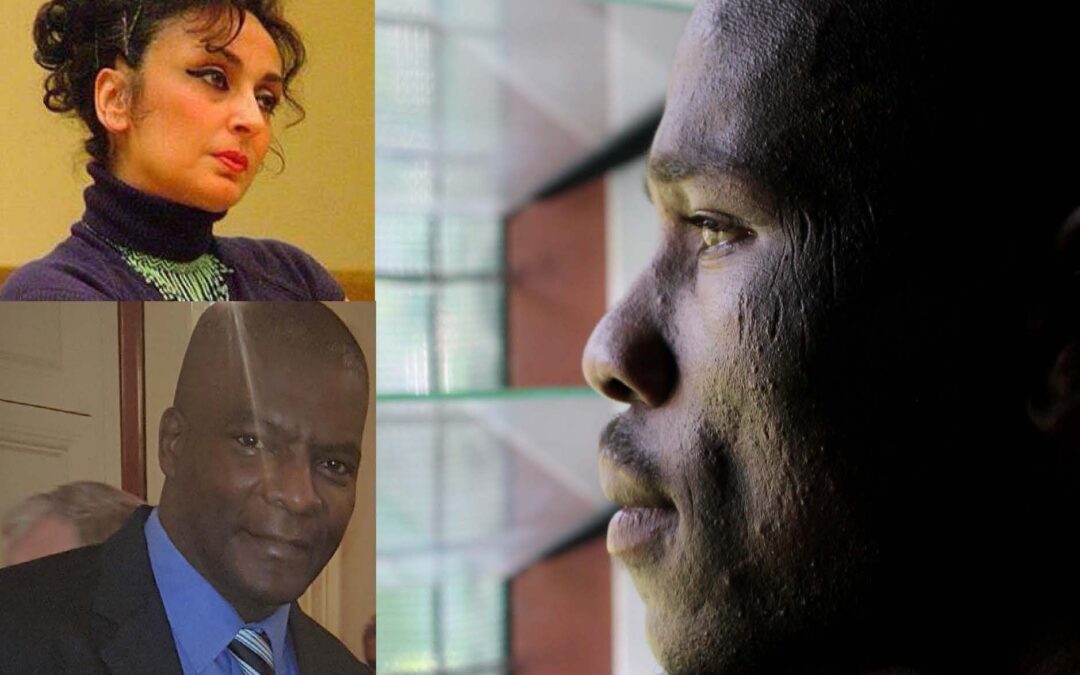
Oct 24, 2018 | Comunicados de prensa, Noticias
Eren Keskin (Turquía), Marino Cordoba Berrio (Colombia) y Abdul Aziz Muhamat (Papua Nueva Guinea / Australia) competirán por este prestigioso premio otorgado a los defensores de los derechos humanos que han demostrado una profunda compromiso y afrontan altos riesgos personales. La CIJ es miembro del jurado.
Los finalistas han sido seleccionados por la Comunidad Internacional de Derechos Humanos (los miembros del jurado son la CIJ, Amnesty International, Human Rights Watch, Human Rights First, International Federation for Human Rights, World Organisation Against Torture, Front Line Defenders, EWDE Germany, International Service for Human Rights y HURIDOCS).
Los galardonados son seleccionados porque han demostrado un profundo compromiso con los derechos humanos, a menudo trabajando bajo amenaza de encarcelamiento, tortura o algo peor. El reconocimiento internacional otorgado por el Premio, además de elevar su perfil y su trabajo, a menudo proporciona una protección significativa.
El Premio Martin Ennals 2019 se entregará el 13 de febrero de 2019 en una ceremonia organizada por la Ciudad de Ginebra, que durante muchos años ha apoyado firmemente el Premio.
Marino Córdoba Berrio (Colombia)
Miembro de la comunidad afro-colombiano, Marino Córdoba Berrio (abajo a la izquierda en la foto) dirigió a su comunidad al enfrentar la pérdida de sus tierras ante poderosos intereses comerciales, en particular en la tala de bosques y la minería.
Después de trabajar con éxito para obtener el reconocimiento legal de los derechos sobre la tierra de su comunidad, gran parte de su comunidad fue expulsada por la fuerza en 1996.
Las amenazas y los ataques constantes lo llevaron a buscar Asilo Político en los Estados Unidos en 2002, donde construyó una red de partidarios en apoyo a su comunidad y la paz.
Regresó a Colombia en 2012 y desde entonces viene trabajando para garantizar inclusión de las comunidades étnicas en el acuerdo de paz, en particular como miembro de la “Comisión Étnica para la Paz y la Defensa de los Derechos Territoriales” que proporciona información a medida que se implementa el acuerdo de paz.
Él ha recibido regularmente amenazas de muerte y está bajo seguridad constante.
Afirmó que: “históricamente hemos sido excluidos política, social y económicamente, desproporcionadamente afectados por la discriminación estatal, también afectados por la crueldad de la guerra, por lo que proporcionar medidas de superación e inclusión del pueblo Afrocolombiano es una responsabilidad primordial del Estado. Creo en el poder de mi mente y en mis manos como un factor determinante para hacer lo correcto por la paz, por lo tanto, la justicia que se aplique a mi pueblo es crucial para su supervivencia, por lo que está en nuestras manos promover cambios justos y humanos, aun en momentos de constantes persecución y asesinatos de líderes importantes y soñadores en mi país y, aun por encima de mi propia vida. Si este esfuerzo implica exponer mi vida creo que será siempre con amor a mi causa y a mi gente”.
Eren Keskin (Turquía)
Eren Keskin (parte superior izquierda de la foto) es un abogado y activista de derechos humanos.
Durante más de treinta años, ella ha luchado por los derechos y libertades fundamentales en Turquía, especialmente por los Kurdos, las mujeres y la comunidad LGBTI.
En el contexto del empeoramiento de la situación de los derechos humanos en Turquía, Keskin se encuentra una vez más en el centro de los intentos de intimidación.
Como parte de una campaña de solidaridad para apoyar al periódico Özgür Gündem, Keskin sostuvo el título de “editor en jefe” del periódico desde 2013 hasta 2016, cuando fue clausurado por las autoridades.
El 30 de marzo de 2018, fue condenada y sentenciada a 12,5 años de cárcel por haber publicado artículos que se consideraba que habían “degradado” a la nación turca e “insultado” al presidente turco. Actualmente está libre mientras se apela el caso.
Ella afirmó: “Defender los derechos humanos no es fácil en nuestro territorio. Estoy siendo procesado con 143 cargos por mi solidaridad con un periódico de la oposición en el contexto de la libertad de expresión. Los premios internacionales y la solidaridad tienen características “protectoras” y tranquilizan a quienes estamos en sociedades represivas. También nos da un impulso moral y ayuda a nuestra motivación para la lucha. Gracias por no olvidarnos. Tu solidaridad y protección significan mucho”.
Abdul Aziz Muhamat (Papua Nueva Guinea / Australia)
Abdul Aziz Muhamat (Aziz, en la derecha en la foto), de Sudán, es un defensor convincente e incansable de los derechos de los refugiados.
En busca de asilo, se encuentra recluido en detención de inmigrantes en Australia en la isla Manus, Papúa Nueva Guinea, desde octubre de 2013, cuando las autoridades australianas interceptaron su barco.
Aziz ha visto morir a sus amigos. Ha recibido disparos de la policía local. También fue enviado a una prisión local por negarse a comer en protesta por la crueldad y el sufrimiento infligido a otros.
Aziz es una de las principales voces públicas entre los hombres detenidos en la isla Manus.
A pesar de la ubicación aislada, ha expuesto las duras condiciones allí a través de podcasts y entrevistas con los medios. Él ha pagado un precio por esto, ya que es visto como un “líder de la banda” tanto por parte de PNG como de las autoridades australianas.
Ella declaró: “Mi trabajo para exponer este sistema cruel me ayuda a preservar mi autoestima y la dignidad humana inherente. Me ayuda a luchar por los derechos de cada refugiado en todo el universo, lo que haré hasta mi último aliento. No siempre es fácil cuando se vive en condiciones de miedo y persecución. Sin embargo, incluso bajo la maquinaria más aplastante del estado, el coraje se levanta una y otra vez, porque el miedo no es el estado natural y haré todo lo posible para seguir adelante”.
Contactos
Olivier van Bogaert, Director de comunicación de la CIJ, miembro del jurado, t: +41 22 979 38 08 ; e: olivier.vanbogaert(a)icj.org
Michael Khambatta, Director, Fundación Martin Ennals, t: +41 79 474 8208 ; e: khambatta(a)martinennalsaward.org
COL-Marino Cordoba Bio-News-2018-SPA (biografía completa de Marino Córdoba Berrio, en PDF)
TUR-Eren Keskin_Bio-News-2018-ENG (biografía completa de Eren Keskin, en inglés, PDF)
AUS-Abdul Aziz Muhamat Bio-News-2018-ENG (biografía completa de Abdul Aziz Muhamat, en inglés, PDF)
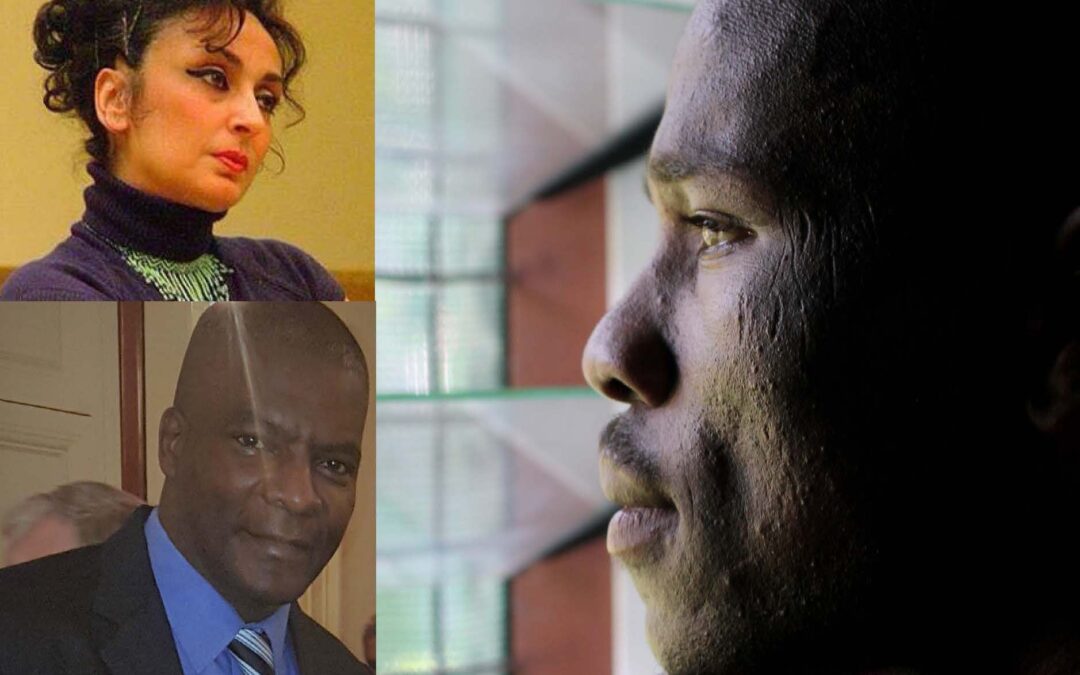
Oct 24, 2018 | Communiqués de presse, Nouvelles
Eren Keskin (Turquie), Marino Córdoba Berrio (Colombie) et Abdul Aziz Muhamat (Papouasie-Nouvelle-Guinée / Australie) se disputeront ce prix prestigieux remis aux défenseur(e)s des droits de l’Homme ayant fait preuve d’un profond engagement et confronté(e)s à de grands risques personnels. La CIJ est membre du jury.
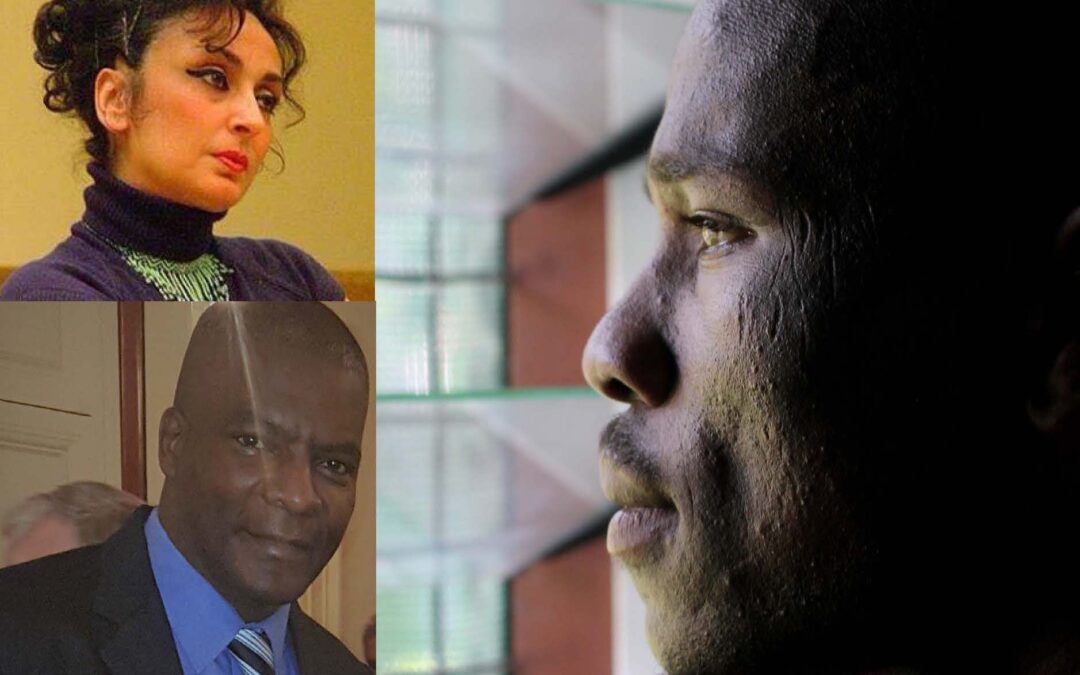
Oct 24, 2018 | News
The three finalists who will compete for this prestigious award given to human rights defenders having shown deep commitment and facing great personal risk are: Eren Keskin (Turkey), Marino Córdoba Berrio (Colombia) and Abdul Aziz Muhamat (Papua New Guinea/Australia). The ICJ is member of the MEA Jury.
The finalists were selected by the International Human Rights Community (members of the jury are the ICJ, Amnesty International, Human Rights Watch, Human Rights First, International Federation for Human Rights, World Organisation Against Torture, Front Line Defenders, EWDE Germany, International Service for Human Rights and HURIDOCS).
Nominees and laureates of the Martin Ennals Award for Human Rights Defenders (MEA) are human rights defenders that have demonstrated a deep commitment to human rights, often working under threat of imprisonment, torture, or worse.
The international recognition provided by the Award, on top of raising their profile and their work, often provides significant protection.
The 2019 Martin Ennals Award will be presented on 13 February 2019 at a ceremony hosted by the City of Geneva, which for many years has strongly supported the Award.
Eren Keskin (Turkey)
Eren Keskin (upper left corner of the picture) is a lawyer and human rights activist.
For more than thirty years, she has struggled for fundamental rights and freedoms in Turkey, especially for the Kurds, women and the LGBTI+ community.
Within the context of the worsening human rights situation in Turkey, Keskin is once again at the centre of intimidation attempts.
As part of a solidarity campaign to support the Özgür Gündem newspaper, Keskin held the title of “editor-in-chief” of the newspaper from 2013 to 2016, when it was closed by the authorities.
On 30 March 2018, she was convicted and sentenced to 12.5 years in jail for having published articles deemed to have “degraded” the Turkish nation and “insulted” the Turkish president.
She is currently free while the case is appealed.
She said: “To defend human rights is not easy in our territory. I am being prosecuted with 143 charges for my solidarity with an opposition newspaper in the context of freedom of expression. International awards and solidarity have “protective” characteristics and reassure those of us in repressive societies. It also it gives us a morale boost and helps our motivation for the struggle. Thank you for not forgetting us. Your solidarity and protection mean so much.”
Marino Córdoba Berrio (Colombia)
A member of the Afro-Colombian ethnic group, Marino Córdoba Berrio (bottom left corner of the picture) led his community as they faced the loss of their land to powerful commercial interests, notably in logging and mining.
After successfully working towards the legal recognition of their community’s land rights, much of his community was driven out by force in 1996.
Constant threats and attacks drove him to seek asylum in the United States in 2002 where he built a network of supporters.
He returned to Colombia in 2012 and worked to ensure a role for ethnic communities in the peace agreement, notably as a member of “Ethnic Commission for Peace and the Defense of Territorial Rights ” that provides input as the peace agreement is implemented.
He has regularly received death threats and is under constant armed guard.
He said: “We have historically been excluded politically, socially and economically, also affected by war, providing measures of overcoming is a primary responsibility of the State. I believe in the power of my mind and my hands as a determinant to do what is right, therefore the justice that is applied to my people is crucial for their survival. It is also in our hands to promote those changes so this effort involves exposing my own life.”
Abdul Aziz Muhamat (Papua New Guinea/Australia)
Abdul Aziz Muhamat (Aziz, on the right-hand side of the picture), from Sudan, is a compelling and tireless advocate for refugee rights.
Seeking asylum, he has been held in Australian immigration detention on Manus Island, Papua New Guinea since October 2013, when his boat was intercepted by the Australian authorities.
Aziz has seen friends die. He has been shot at by local police. He was also sent to a local prison for refusing to eat in protest at the cruelty and suffering being inflicted on others.
Aziz is one of the primary public voices among the men held on Manus Island. Despite the isolated location, he has exposed the harsh conditions there through podcasts and media interviews.
He has paid a price for this as he is seen as a “ring leader” by both the PNG and Australian authorities.
He stated: “My work to expose this cruel system helps preserve my self-respect and inherent human dignity. It helps me fight for the rights of every refugee around the universe, which I’ll do until my last breath. It is not always easy when living under conditions of fear and persecution. Yet even under the most crushing state machinery, courage rises up again and again, for fear is not the natural state and I will do everything to keep going.”
Contact
Olivier van Bogaert, Director Media & Communications, ICJ representative in the MEA Jury, t: +41 22 979 38 08 ; e: olivier.vanbogaert(a)icj.org
Michael Khambatta, Director, Martin Ennals Foundation, t: +41 79 474 8208 ; e: khambatta(a)martinennalsaward.org
TUR-Eren Keskin_Bio-News-2018-ENG (Eren Keskin full bio in PDF)
COL-Marino Cordoba Bio-News-2018-ENG (Marino Córdoba Berrio full bio in PDF)
AUS-Abdul Aziz Muhamat Bio-News-2018-ENG (Abdul Aziz Muhamat full bio in PDF)
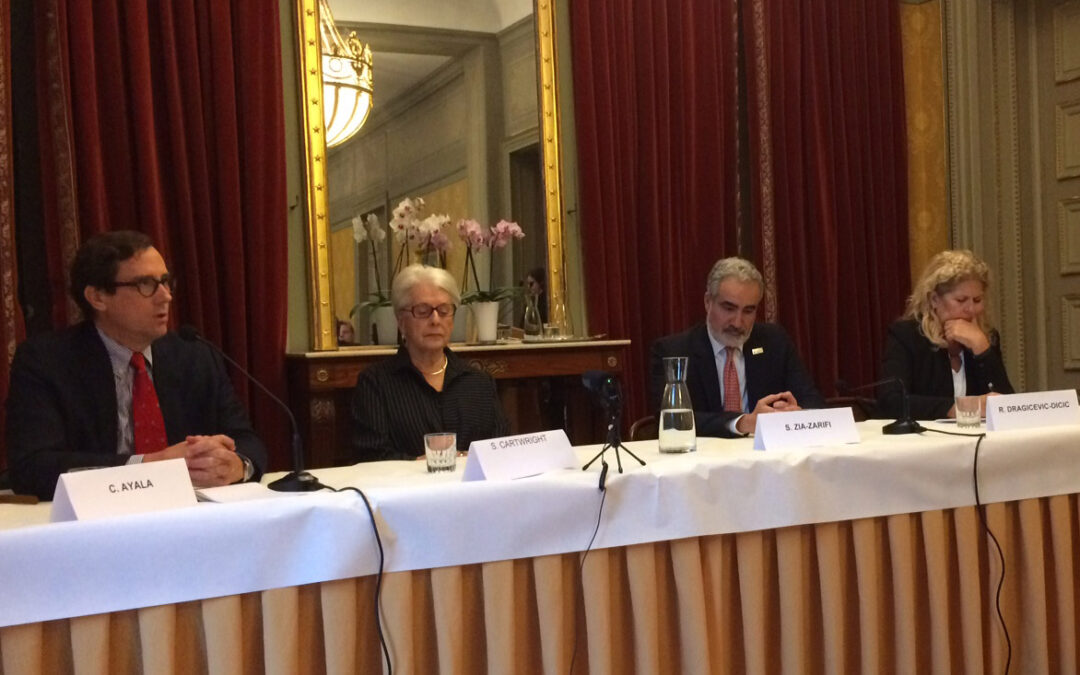
Oct 23, 2018 | Multimedia items, News, Video clips
At an event at the city’s Palais Eynard, prominent ICJ Commissioners discussed the supremacy of the Rule of Law and also why it is important to be in Geneva. Watch the video.
The Executive Committee (ExCo), representing the whole Commission of Jurists, participated in the event.
Sam Zarifi, ICJ Secretary General, opened the event by reiterating the importance for the ICJ to be headquartered in Geneva, not only for the UN and international community but also for the city’s and canton’s legal and human rights community.
“It is absolutely clear that we live at a moment in the world when lawyers, judges, jurists are under attack and it is important for the legal community across the world, regardless of borders, regardless of languages, regardless of legal systems, to come together to defend the notion of the rule of law and defend the security and well-being of lawyers and jurists around the world.”
Carlos Ayala, ICJ’s Vice-President, said the ICJ was a unique organization working in the field of the Rule of Law, not as an isolated notion but within the framework of Human Rights and democracy.
He explained how the ICJ is structured and working around the world and insisted on the impact the ICJ is having through its activities.
He said that the organization’s legal outputs were used to have an impact on the overall human rights situations, cases, court decisions, and in training judges, lawyers, prosecutors and others.
Radmila Dragicevic-Dicic, also ICJ’s Vice-President, insisted on how it is important to share experiences about human rights issues and finding solutions to protect different rights.
She gave her personal example of being a judge in former Yugoslavia and Serbia to show how with tenacity and courage one can help establish an independent judiciary even in some of the hardest situations.
She testified how she was helped by the ICJ and Switzerland in her fight for justice.
“If you fight for independence of judges and lawyers in your country, you fight for judges and lawyers everywhere,” she added.
Dame Silvia Cartwright, ICJ Commissioner and ExCo member from New Zealand, was the first woman appointed to the High Court in New Zealand and she was also Governor General of New Zealand.
She said that she was privileged to come from a country that has always promoted and protected the Rule of Law but that unfortunately many recent examples showed that this endorsement could change overnight.
Very active in the fight for women’s rights she said how through her professional work she realized the terrible impact that the Khmer Rouge’s regime in Cambodia and civil war in Sri Lanka had on women.
“Generally speaking I’m quite pessimistic because I think we have reached another stage of the cycle that seems to occur every couple of generations where we are heading towards a more fascist world. So this is the time when human rights must be protected when we must fight to maintain the norms we have struggled for so long,” she said.
Watch the full event here:
https://www.facebook.com/ridhglobal/videos/335212527229422/









